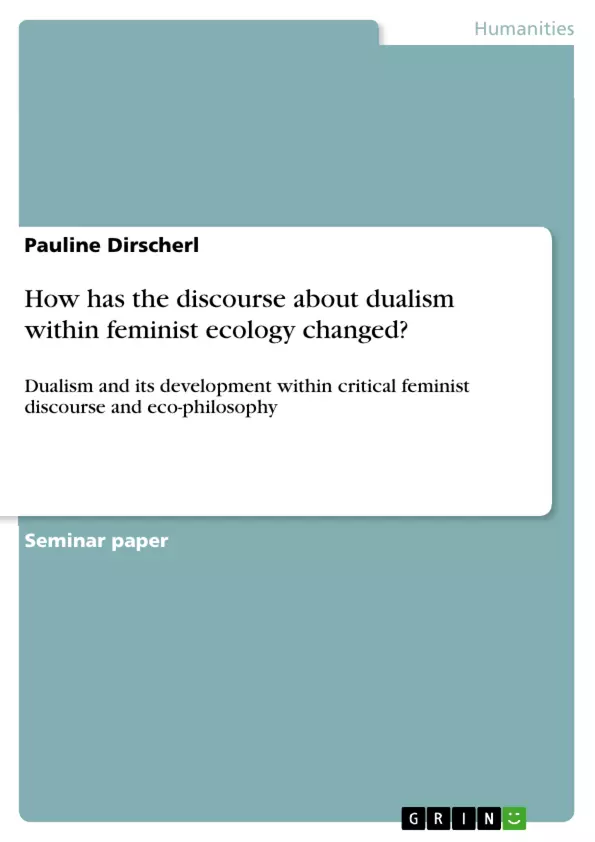How has the discourse about dualism within feminist ecology changed from the beginning of the first ecofeminist movement? How can the perception of dualism be transformed from an exclusive hierarchical one to one that recognizes the mutual dependency and relationality of the distinctive orders?
The intent of this paper is to give a brief insight in the history of dualism and its development within critical feminist discourse and eco-philosophy while it focuses on gender relations, demarcating from the impacts on nature which would require further examination.
The first part of my research paper delineates the history of contrasting traditional dualisms like the reason/nature dualism, unfolds the effects and features of an exclusive system like this and explains what concept of the human is undermining by retracing Plumwoods main arguments in her book “Mastery of Nature” from 1993. Furthermore, I describe how the exclusive human/nature dualism has been dealt with in the past from a cultural and liberal ecofeminist perspective during second-wave feminism. After the examination of how humans were constructed historically against nature, the second part is dedicated to the construction of a non-hierarchical dualism through a new concept of relationality that was introduced as critique of essentialist from critical ecological feminist positions like Mathews. Subsequently the relational construction of re/productivity and Donna Haraway´s phrase naturecultures will be exemplified to display the potential of a relational concept for the symbolic and material transformation of exclusive dualisms.
Table of Contents
- Humans versus nature.
- History of dualism...
- The tradition of hierarchical dualism..
- Plumwoods master identity and the colonised “other”.
- Features of the human/nature dualism..
- Ecofeminists reactions on the human/nature discourse.
- Feminism of uncritical equality.
- Feminism of uncritical reversal..
- Subverting dualism.…....
- Relationality as new concept..
- Re/productivity...
- Haraway's naturecultures.
- Humans with nature?.
Objectives and Key Themes
This paper aims to explore the historical development of the human/nature dualism within feminist ecological discourse, examining its impact on gender relations. It seeks to understand how the perception of dualism has evolved from a hierarchical system to one recognizing mutual dependency and relationality.
- The history of dualism and its influence on gender relations.
- The impact of traditional dualistic concepts like reason/nature, culture/nature, and male/female on women's representation.
- The development of ecofeminist thought and its critique of essentialist dualism.
- The emergence of relationality as a new concept to understand human-nature interactions.
- The application of relationality to re/productivity and naturecultures.
Chapter Summaries
The paper begins by introducing the concept of dualism, outlining its historical roots and the implications for women's position in relation to nature. The first chapter explores the tradition of hierarchical dualism, highlighting the work of Val Plumwood and her analysis of "mastery of nature." It then examines how ecofeminists have reacted to this dualistic discourse, focusing on the shortcomings of both uncritical equality and uncritical reversal approaches.
The second chapter delves into the construction of a non-hierarchical dualism through the concept of relationality. The author discusses the contributions of critical ecological feminists such as Mathews and their rejection of essentialism. Examples of relational constructions, like re/productivity and Donna Haraway's naturecultures, are presented to illustrate the potential of this approach.
Keywords
This paper explores the human/nature dualism, ecofeminist thought, relationality, re/productivity, naturecultures, critical ecological feminism, and gender relations. The paper's central focus is on the historical development of the dualistic concept and its impact on the construction of gender identities. It further examines the potential of relationality as a concept for subverting traditional hierarchical dualisms.
- Quote paper
- Pauline Dirscherl (Author), 2020, How has the discourse about dualism within feminist ecology changed?, Munich, GRIN Verlag, https://www.grin.com/document/976220



